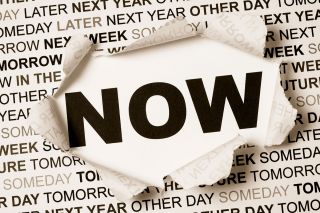Procrastination
Is Your Planning Really Procrastination?
What’s the line between planning and procrastination?
Posted January 20, 2015

A comment in an online forum caught my eye the other day. It was from an aspiring entrepreneur who had spent years planning a solo freelance business and was now “starting to get started.”
Perhaps all the preparation was necessary, but it got me wondering: What’s the line between planning and procrastination?
“Starting to get started” is a feeling I think all of us can understand. There is so much that is beguiling in planning the things we will create and do - the business we’ll start, the art we’ll construct, the career we’ll pursue, the book we’ll write.
When we are at the planning stage, we are in that magical territory where all things remain possible. Take that first step toward actually making your dream a reality, however, and you may just be taking your first step toward killing it. Let’s face it, not every business succeeds, not every creation is “art,” and we don’t always sell the screenplay. So who can blame us for lingering over our plans, toying with them, analyzing them, perfecting them?
Don’t get me wrong; planning is a necessary and positive thing and can dramatically boost the chances of a successful endeavor. But at some point, unless we are content to end our lives with nothing more than good intentions, we have to stop planning and start doing.
Talking Back to Negativity
When we find ourselves spinning our wheels, it’s generally because we’ve started listening to that inner voice that seems to delight in telling us nothing will turn out as we plan and that we are fools for trying.
We all have that voice and can usually keep the volume down. However, introduce a little vulnerability into our lives — such as the launch of a new endeavor — and that’s suddenly all we can hear. What if I fail? What if no one likes it? What if I’m just not good enough?
Learning to talk back to that voice can give us the courage we need to finally move from planning to producing. But we need to be a realistic advocate for ourselves - not just pumping ourselves up with platitudes but acknowledging the challenges we face and the risks we are taking.
The reality is:
- What if I fail?
Yes, you may indeed fail to make your dream a reality. But this is what you’ll gain: the pride of knowing you didn’t just spend your life on the sidelines. Unlike the people who are content to criticize the efforts of those who put themselves out there, you are attempting to share something of yourself with the world. Even if you do fail, it simply means you failed this time – just like J.K. Rowling, who failed at her first 11 attempts to get a publisher for Harry Potter, or Walt Disney, who failed at multiple businesses before Mickey. If you do make another attempt, you’ll have learned invaluable lessons that can only make success more likely.
- What if no one likes it?
It’s just as unlikely that no one will like what you’ve produced as it is that everyone will like it. So aim for pleasing yourself instead. If you stay true to your vision, you’ll be much more satisfied with any accolades that come your way. This doesn’t mean not to seek out the advice and expertise of others who have things to teach you, of course, but it does mean to be aware that’s it’s all too easy to begin adding and subtracting based upon the reactions of others until all of your creativity and originality is stripped away.
- What if I’m just not good enough?
Why not put the power of positive psychology to work and ask yourself, What if I AM good enough? Imagine the future that could result if this turns out to be true. Whether your efforts ultimately prove to be “good enough” or not, one thing is certain: If you never try to accomplish the things that are meaningful to you, it’s a sure bet you won’t be on your deathbed saying, “I’m so glad I played it safe.” What’s much more likely is you’ll be asking yourself, “What was I so afraid of?”
David Sack, M.D., is board certified in psychiatry, addiction psychiatry and addiction medicine. Dr. Sack currently serves as CEO of Elements Behavioral Health, a network of addiction treatment centers that includes Promises Treatment Centers, The Ranch, Sexual Recovery Institute, The Recovery Place, Right Step, Promises Austin, Lucida, Journey, Sundance, Clarity Way, Brightwater Landing and Park Bench.


